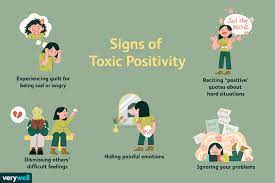Toxic positivity is an unhealthy mindset where one insists on maintaining a positive outlook despite actual circumstances or emotions. It negates the existence of negative emotions and instead leads to the suppression of feelings. Schools are a breeding ground for toxic positivity, where students are often encouraged to be happy and optimistic at all times.
Here are eight incredibly common phrases that promote toxic positivity in schools:
1. “Just be positive.”
Telling someone to simply be positive can ignore the validity of their feelings. Instead of forcing positivity upon people, we should be teaching students to embrace and express their emotions healthily, both positive and negative.
2. “It could always be worse.”
By comparing their issues to others’, students may feel guilty for having negative emotions which may cause them to suppress their feelings. Acknowledging and validating individual struggles is essential for healthy emotional growth.
3. “Don’t cry; everything will be okay.”
This phrase discourages emotional expression and implies that crying or showing sadness is weak or inappropriate. Students should learn that it is okay to emote and experience negative feelings.
4. “You’ll get over it eventually.”
Telling someone they’ll get over their problems can be dismissive and insensitive, making them feel unheard and undervalued. It is important for teachers and peers in schools to empathize and truly listen when a student expresses their concerns.
5. “Failure is not an option.”
While pushing students towards success is essential, emphasizing this phrase may impart a fear of failure in them, resulting in excessive stress and anxiety. It’s crucial for students to understand that everyone fails sometimes, and it’s a part of the learning process.
6. “Keep that smile on your face!”
Forcing positivity upon others by insisting they should smile can make students feel invalidated when they’re going through tough times. We need to accept that everyone has bad days and allow space for the expression of genuine emotions.
7. “Good vibes only.”
Creating a ‘good vibes only’ environment may inadvertently lead to toxicity, as it denies the presence of any negative emotions. Instead, schools should strive to encourage emotional diversity and open communication.
8. “Choose happiness.”
Implying that happiness is a choice oversimplifies mental health and dismisses complex emotions that students may be experiencing. We need to recognize that some situations and circumstances might be out of one’s control and it’s not always easy to choose happiness.
In conclusion, it is crucial for schools to become more aware of toxic positivity and its implications on students’ mental health. By recognizing these common phrases and replacing them with a more empathetic approach, we can create healthier environments where students are encouraged to express their emotions authentically.





